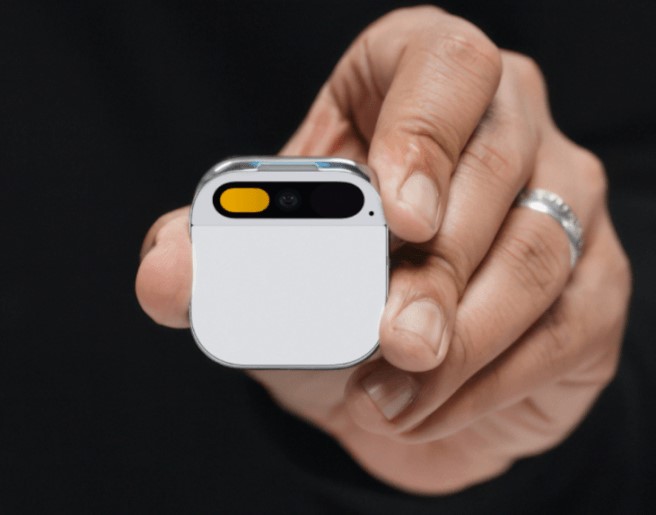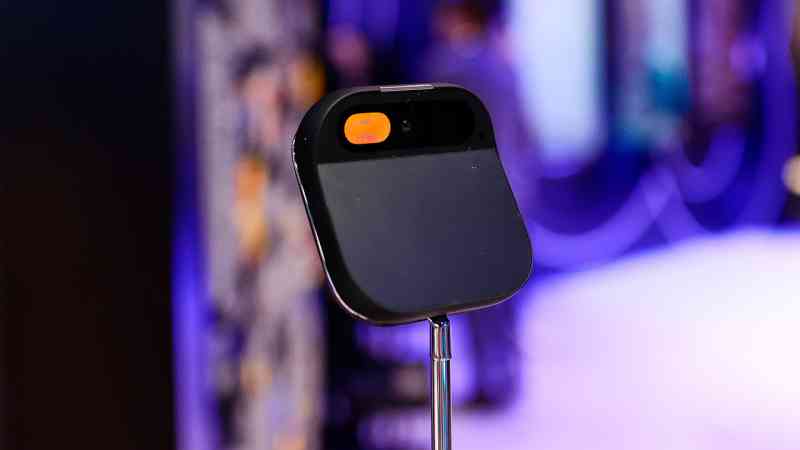‘Worst product ever’: the AI smartphone alternative that can’t make a call
A new AI device touted as an antidote to our smartphone addiction appears to have flopped on launch with one expert calling it the “worst product I’ve ever reviewed”.
The Humane AI Pin is a $700 screenless, wearable computer that clips to your clothes. It has a camera, microphone, speaker, sensors and laser projector and you interact with it by talking. Instead of pulling out your phone to search the internet, call, text or email, you just tell the Pin to do it.
The company Humane, co-founded by a Briton who used to work at Apple, said it is the “first wearable device and software platform built to harness the full power of artificial intelligence”.
Presently available in the US only, it does not pair to your smartphone but is a stand-alone device with a phone connection that comes with a $24-a-month subscription.
American reviewers have slated the Pin, which they said was slow to respond, overheated and failed in basic functions such as making a phone call, playing a song, sending an email and setting a timer, reminder or alarm. It was hard to hear the device outside without headphones or to see the images it can project onto your hand. Its battery life was also poor.
The device often provided inaccurate information and at one point suggested that a reviewer use a Google app instead.
Marques Brownlee, an influential YouTube reviewer, said: “It’s the worst product I’ve ever reviewed in its current state. This thing is bad at almost everything it does, basically all the time.”

David Pierce, an editor at The Verge technology website, said: “The AI Pin doesn’t work. I don’t know how else to say it.” Cherlynn Low of Engadget said it was “the solution to none of technology’s problems”.
Some of the Pin’s problems stem from the fact that it does little computing on the device but uses the cloud instead, creating lags in performance.
The Pin is the brainchild of Imran Chaudhri, a Briton who was Apple’s design director, and his wife, Bethany Bongiorno, a former director of software at Apple. They met while working on the iPad.
The couple poached 90 staff from Apple to start Humane, which has received hundreds of millions of dollars in funding from Silicon Valley and counts Sam Altman, the OpenAI chief executive, as an investor.
Chaudhri created a buzz for the Pin with a demo at the TED conference last May and Naomi Campbell wore one on the catwalk at Paris Fashion Week.
Its release comes just weeks before the shipping of another stand-alone AI device called the “rabbit R1” that acts as a personal assistant to navigate the ever-increasing number of apps.
Phone manufacturers such asGoogle and Samsung have started to react to this threat and are incorporating AI features including translation, transcription and photo editing in their devices. Apple is expected to unveil AI features this summer to be incorporated into the iPhone 16.
Ben Wood, chief analyst at CCS Insight, said: “AI is the hottest topic in tech right now so it’s little surprise that hype has got ahead of reality. The reviews for the Humane AI Pin reflect this and it won’t be the only product to over-promise and under-deliver this year.”

While the reviewers were universal in criticising the Pin’s functioning, many praised some of its features and the concept of having a smart, screenless assistant.
Pierce, as well as Joanna Stern of The Wall Street Journal, were impressed with the Pin’s ability to interpret its surroundings, looking at objects and giving information about them. However, its performance was patchy, misidentifying the Brooklyn Bridge as the Robert F Kennedy Bridge.
In response to the Brownlee review, Sam Sheffer, Humane’s head of new media, posted on Twitter/X: “All fair and valid critiques, both the good and the bad. Feedback is a gift. We reflect and we listen and we learn and we continue building.”
Humane’s co-founders said in a statement: “Today marks not the first chapter, but the first page. We have an ambitious road map with software refinements, new features, additional partnerships, and our SDK [software development kit]. All of this will enable your AI Pin to become smarter and more powerful over time.”
Other AI devices vying to replace your smartphone
Rabbit r1: a pocket-sized device that is designed to be an AI assistant that, when provided with verbal instructions, will provide you with information or carry out tasks such as ordering a taxi or pizza or planning a trip. No phone connection. Priced at $199, it is available in the US only.
AI pendants: The Limitless Pendant records your conversations and then enables you to sift through them, like a searchable database of your life. The Tab is a similar device
Smart glasses: Meta’s Ray-Ban glasses will soon be upgraded with AI software so they can scan and interpret your surroundings and translate languages. The start-up Brilliant Labs has a similar product called The Frame
Smartphones: Google, Samsung and Honor have all unveiled AI features in recent months including translation, transcription, “circle to search” and photo editing




Post Comment